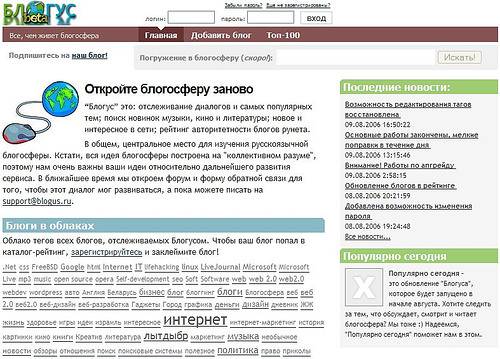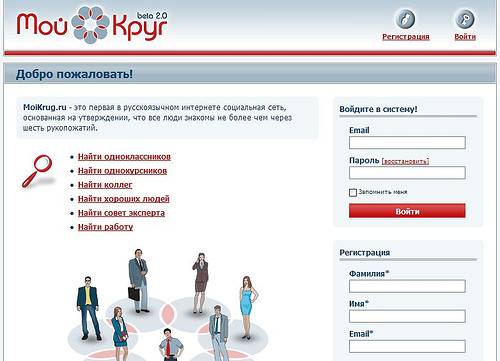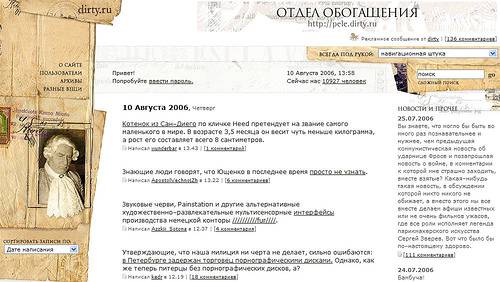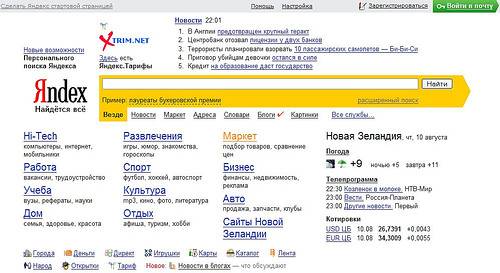Next in my series
on top Web apps in international markets is Russia. To remind you of the previous
countries profiled: Germany, Holland, Poland, Korea and United Kingdom.
Other country profiles coming soon include Spain, Turkey, Australia, New Zealand (if I
can rustle up enough web apps from the NZ2.0 mailing list!), Latvia, China (I still need
more contacts for this) and Ireland (also needs more data). Do contact me if you can give me information about
web 2.0 in your country.

My thanks to Alexander Dodonov and Anton Antich for all the information about Russian web
apps.
Russia’s Web 2.0 Market
Alexander says that Web 2.0 became popular in Russia only recently and there hasn’t
been much development so far – many projects are in alpha and their business model is not
clear (hmmm, doesn’t sound that different to the Valley!). Russian users use foreign web
2.0 services a lot, such as gmail.com, netvibes, del.icio.us. And livejournal.com is the most popular blog service for
Russians – there are thousands of Russian communites on LJ.
Anton too says that web2.0 is at its infancy in Russia and that a lot of web apps are
inspired by their western counterparts. He said there are 2 key things for a project to
be successful in Russia:
1) It has to be fully localized.
2) It has to work with local payment systems, which are very different than in
the US or UK – “that’s something many of the english language startups don’t get and
that’s why they are not going to be successful here, unless they change”. Anton thinks
this leaves a lot of proven and empty niches in Russia.
Top Russian web apps
blogus.ru – blog rating

Blugus rates blogs by calculating quantity of links from Technorati and blogs.yandex.ru (a local version of Technorati). The
author of service is Anton Antich, one of the sources for this post. He is an employee of
the Moscow office of Microsoft. Alexander said that blogus has drawn the attention of all
the Russian blogosphere – “you can find almost all russian blogs in this service”.
Its creator Anton told me that Blogus has big plans:
“Now there is a vision for “Blogus” to become an instrument of efficient discovery and
tracking of relevant and interesting content on any topic in the Russian Blogosphere. To
do that, we are creating something of a cross between Technorati and
Memeorandum for blog readers – and a set of services that I cannot yet speak of for
bloggers.”
moikrug.ru – social network.

moikrug.ru is the Russian equivalent of linkedin.com (I’ve noticed that most of the
countries I’ve profiled so far have a linkedin clone).
It’s a social network for the professionals, created by group of developers from MIPT,
which was started on 18 Nov 2005. It supports search on schools, high schools,
universities and organizations. There is a job search service and collective blogs. It
contains already tens thousand profiles, is regularly upgraded and the network effects
are growing.
Anton says MoiKrug is doing quite nicely, although it’s missing some of the features
of LinkedIn. He says the quality of interactions is also lower, but thinks it will
improve over time.

This is a collective blog, created by Jovan Savovich (http://jovan.ru/). It was created a long time ago, in
November 2001. Alexander says that Jovan very carefully chooses members of the site
community. He says Jovan is a person with imagination and that dirty.ru rules are strict – but fun.
dirty.ru is the most visited collective blog of the
russian Internet (RuNet). There is a “dirty effect”, same as the slashdot effect! There
are over 10000 registered users – mainly programmers and designers, but also politicians,
scientists, musicians and others.
The site has set of sections. For example, for free chatter exists a closed
(registered use only) blog named “leper colony” (http://leprosorium.dirty.ru/). There are
galleries of images by dirty members (http://fake.dirty.ru/) and a rich collection of quotes
(http://quotes.dirty.ru/).

This is the Russian equivalent of Google. It has its own RSS reader (lenta.yandex.ru) and blog search (blogs.yandex.ru).
Other Russian Web Apps
Here are more Russian web 2.0 apps (c/o Alexander and Anton):
- revolver.ru – like dirty.ru, a russian equivalent of SlashDot
- toodoo.ru – social network. There are user accounts
and each user indicates his favorite sites – and he can find another users who read the
same sites. - rss2email.ru – equivalent of FeedBleatz.
- habrahabr.ru – service for free journalism.
- comby.ru – clone of MySpace
- liveinternet.ru, diary.ru – blog services.
- utx.ambience.ru – system for categorization and
social organization of blog posts. - blogosphera.net – catalogue of favicons of
different russian blogs - talxy.ru – let’s write together. Public
collaboration. - keep4u.ru – photo hosting and online photo
editing. - http://news2.ru – analog of digg.com, started about 6 months ago and is steadily growing
in popularity. - http://www.russianpodcasting.ru/ –
portal of services for podcasters and podcasting consumers, started by Russian ex-MTV
“VJ” Vasily Strelnikov. Anton says: “It is actually nothing more than a storage and a
catalog now, but being the first in the area helps. The guys started mobile podcasting
service some 1 year ago, but it didn’t take off – I guess it was too early a concept.
Pity – there are only about 20M internet users in Russia and about 100M mobile phones, so
figuring out what to do with the latter market is a much more rewarding goal.” - http://telesa.tv/ – original project of
home-grown flash “television” – shows, cartoons etc in flash and work similar to “real”
tv. Entertainment oriented and quite popular, rumor has it it was acquired recently by a
local strategic investor. - http://blogsummit.ru – one of the first blog
networks here. Also just started.
A huge thanks to Alexander and Anton for all the info about the Russian Web
market.





















